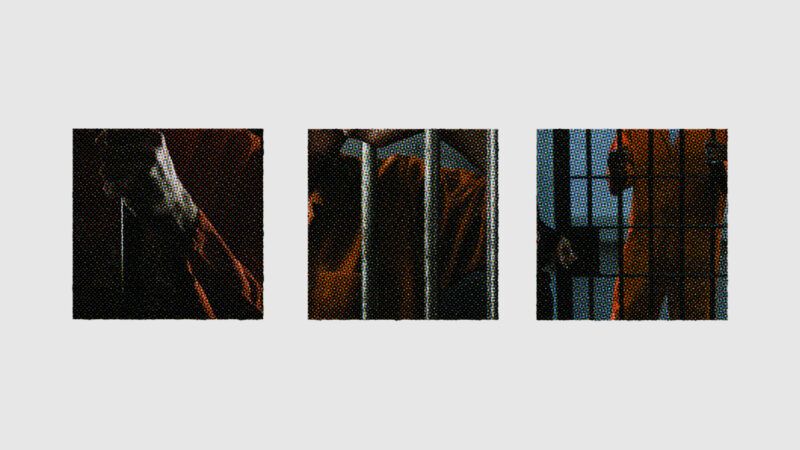The Government Says These Missouri Men Are Innocent. It Won't Release Them From Prison.
Kevin Strickland, Christopher Dunn, and Lamar Johnson are still paying for crimes that government officials say they did not commit.

Kevin Strickland, Christopher Dunn, and Lamar Johnson all have something in common: they all have spent decades in the Missouri prison system, they all maintain their innocence, and the cases that led to their convictions have all fallen apart. Yet the men remain behind bars with no release in sight despite various government actors suggesting they should have their verdicts overturned.
It's hard to cook up a more nightmarish scenario.
Dunn was convicted in 1991 of the murder of Ricco Rogers, who was shot while on a neighborhood porch when Dunn was 18. The lone evidence against Dunn: the testimony of two boys who said later that they had been coerced by prosecutors and the police.
"Coupled with the evidence in the record that Petitioner had an alibi," wrote Texas County (Missouri) Circuit Court Judge William E. Hickle in a habeas corpus ruling issued last fall. "This Court does not believe that any jury would now convict Christopher Dunn under these facts."
But Hickle's finding is not enough to set Dunn free, thanks to a Missouri Supreme Court precedent that holds such "freestanding" claims of innocence be limited to prisoners on death row. In other words, had Dunn been sentenced to die for the 1990 crime, he would be in a more advantageous position today. Instead, he received life without parole and thus has no recourse.
"To sit there and watch the judge's reaction to everything the witnesses said, I just knew there was a chance I was going to walk out of there," Dunn told the St. Louis Post-Dispatch in April. "To hear him say I was innocent, but yet he can't free me because I'm not a death row inmate, I didn't understand."
Johnson and Strickland's cases are even more absurd, in that prosecutors agree they are innocent. "My job is to apologize" to Strickland, said Jackson County prosecutor Jean Peters Baker at a press conference in May. "It is important to recognize when the system has made wrongs…and what we did in this case was wrong. So, to Mr. Strickland, I am profoundly sorry."
Now 62, Strickland was sentenced to life in prison without the possibility of parole in 1979 for a triple-murder that took place the year prior in Kansas City. He has had several heart attacks and sometimes needs a wheelchair.
Strickland's conviction was also circumstantial, hinging on testimony from a woman named Cynthia Douglas, who picked him from a lineup. She, too, later recanted and said that police had pressured her to select Strickland. His first trial ended in a hung jury, and he was convicted on the second go-round.
"I think I've been destroyed," Strickland told the local ABC affiliate in June. "I've been placed in an environment where I had to adapt to living with all sorts of confessed criminals. The way I see things now is not normal, I would think, for somebody in society."
St. Louis prosecutor Kim Gardner zeroed in on Johnson's case two years back and sought to have him released. Convicted of the 1994 murder of Marcus Boyd, the 49-year-old's story follows a familiar arc: A jury delivered their verdict based only on testimony from a witness who later recanted, admitting police had paid him for his services.
"What we uncovered was devastating, not only to myself, but to the criminal justice system," said Gardner, who described the evidence pointing to Johnson's innocence as "overwhelming" and noted that the jury heard information that was "false and perjured." Two other men, Phillip Campbell and James Howard, confessed to the murder in 1996 and 2002, respectively, and signed affidavits saying that Johnson was not involved. Howard is in prison for a different homicide, and Campbell served just 6 years for a crime that Johnson is still paying for.
The fates of Johnson and Strickland are in the hands of Missouri Attorney General Eric Schmitt, who insists on Strickland's guilt and says that Johnson exhausted all his appeals.
If Schmitt does not petition for their verdicts to be overturned, it would be up to Gov. Mike Parson, a Republican, to issue executive clemency. Parson yesterday released a list of pardons that included Mark and Patricia McCloskey, who attracted national media attention after waving their guns at Black Lives Matter protesters in St. Louis.
In the spirit of forgiveness and redemption, their pardoning makes sense; his failure to also pardon Dunn, Strickland, and Johnson does not. If Parson wants to make a point about prosecutorial overreach, he should grant mercy to prisoners incarcerated for crimes the government concedes they did not commit.


Show Comments (34)